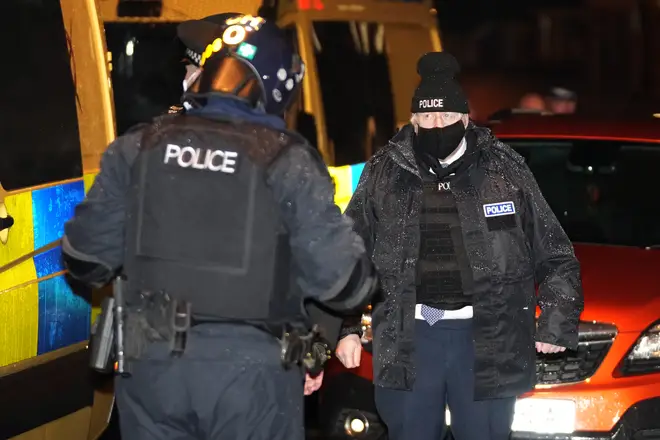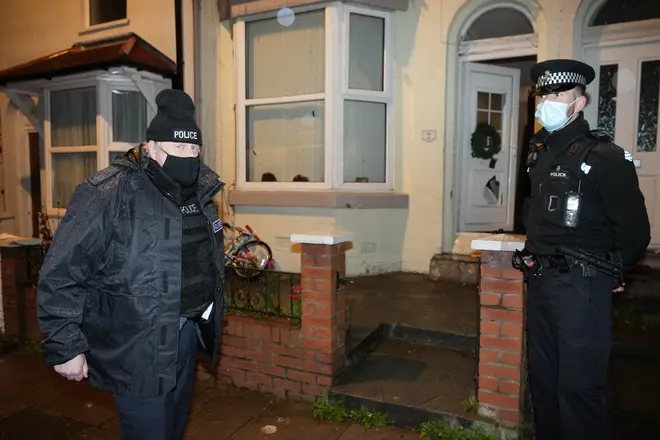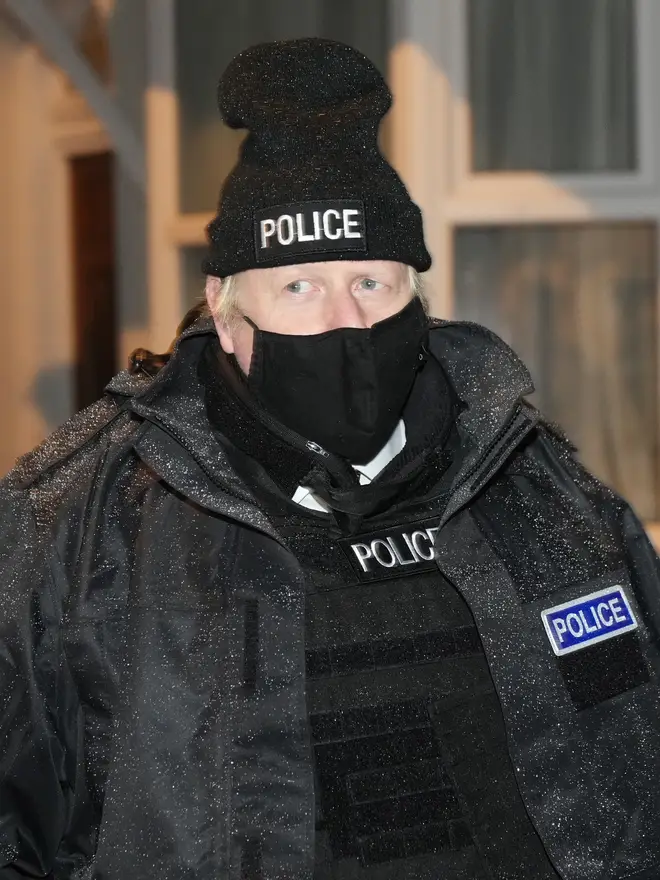
Clive Bull 1am - 4am
6 December 2021, 00:01 | Updated: 6 December 2021, 10:07

Mandatory drug tests for some offenders and the power for police to send messages from drug dealers' phones are among the measures being unveiled in the Government's 10-year drugs strategy.
Boris Johnson is pledging to break up 2,000 "county lines" drugs gangs in a £300 million drive to rid the country's streets of illegal narcotics.
The 10-year plan for England and Wales includes more drug testing on arrest, with police encouraged to direct individuals who test positive towards treatment or other relevant options.
Announcing the plans this morning, Boris Johnson Boris Johnson joined Merseyside Police on a dawn raid on a home in Liverpool as part of 'Operation Toxic' to infiltrate County Lines drug gangs.

Under the plans, judges will be given the power to order drugs tests on offenders serving community sentences for drugs-related crimes, with the prospect of jail if they test positive.
Read more: Water cannons and tear gas used after Brussels anti-restriction protests turn violent
Read more: 'I'm told there was no party': Raab denies No10 Christmas party

When dealers are arrested, police will be able to seize their mobile phones and use them to send messages to their clients to discourage drug use and direct them to support.
The measure is designed to remove the feeling of anonymity when people purchase illegal drugs by making them aware the police know what is going on.
A behaviour change campaign will be also piloted on university campuses to help understand which messages work in discouraging drug misuse at an early stage.

'There should be safe spaces where people who're addicted take drugs.'
The announcement comes after reports that traces of cocaine had been found in areas of Parliament.
Commons Speaker Sir Lindsay Hoyle said he would raise reports of drug misuse in Parliament with the police "as a priority".
In a statement, he said that he expected to see "full and effective enforcement of the law" on the parliamentary estate, after a report in The Sunday Times said detection wipes had found traces of cocaine in 11 out of 12 locations tested amid claims of casual use of the class A drug by a group of MPs.
Sir Lindsay said: "The accounts of drug misuse in Parliament given to the Sunday Times are deeply concerning - and I will be raising them as a priority with the Metropolitan Police this week.
"I expect to see full and effective enforcement of the law.
"While Parliament provides extensive support services for any staff or Members who may need help with drug misuse - and I would encourage anyone struggling with such issues to take up such help - for those who choose to flout the law and bring the institution into disrepute the sanctions are serious."

Former Justice Secretary tells LBC he failed in the war on drugs
The Government's deterrent and preventative measures will run alongside an aggressive campaign aimed at the drugs gangs, with a commitment to dismantle over 2,000 county lines over the next three years involving thousands more arrests.
Police will carry out 6,400 "disruptions" against the activities of organised criminals, targeting the road and rail networks they use while protecting vulnerable young people exploited by the gangs to run drugs for them.
In an interview with The Sun On Sunday, Mr Johnson said it could include removing the passports and driving licences of offenders.
The paper also reported there would be extra cash for 50 local authorities with the worst drug problems, including Middlesbrough, Blackpool, Liverpool, Hull and coastal towns in the North East and Yorkshire.
Read more: Omicron may be less dangerous than Delta, says US health official
Read more: Camilla Tominey hits out at 'disturbing stench' public feels around politicians
Home Secretary Priti Patel said police would target the "kingpins" behind the supply lines, making the streets safe for innocent citizens.
"It is clear that the drugs trade is still driving so much crime - we must do more to prevent these ruthless gangs ruining lives, tearing apart communities and exploiting young people," she said.

'It's no different to something like anorexia or overeating.'
The Home Office said there are 300,000 heroin and crack addicts in England who are responsible for nearly half of acquisitive crime, including burglary and robbery, while drugs drive nearly half of all homicides.
The total cost to society is put at nearly £20 billion a year.
Read more: Hundreds release balloons in memory of little Arthur, 6, to 'show he was loved'
Read more: More than 50 houses evacuated after 'suspicious items' discovered by police
In a statement ahead of the strategy launch, the Prime Minister said: "Drugs are a scourge on our society, fuelling violence on our streets which communities across the country are forced to endure.
"That's why, to cut crime and truly level up across the country, we must step up efforts to wipe out the vile county lines gangs who are blighting our neighbourhoods, exploiting children and ruining lives.
"Backed by record investment, the strategy we're setting out today will attack supply and break the county lines model which sees criminals profit from people's misery.
"Those who break the law will have nowhere to hide."

'What is this kind of stench around politicians?' Camilla asks
For Labour, shadow home secretary Yvette Cooper said that with class A drug use up 27 per cent since 2010 and drugs deaths at a record high, Government action was long overdue.
"More than £100 million has been cut from treatment services, and cuts to policing budgets have meant that specialist drug enforcement teams have taken a backseat, allowing gangs to grow, dealing to increase and demand to soar," she said.
"Drug use is up, serious violence is up, anti-social behaviour is up.
"More and more offenders are getting away with their crimes as overall prosecutions have plummeted.
"Any action from the Government must be substantial enough to undo the damage they have caused."